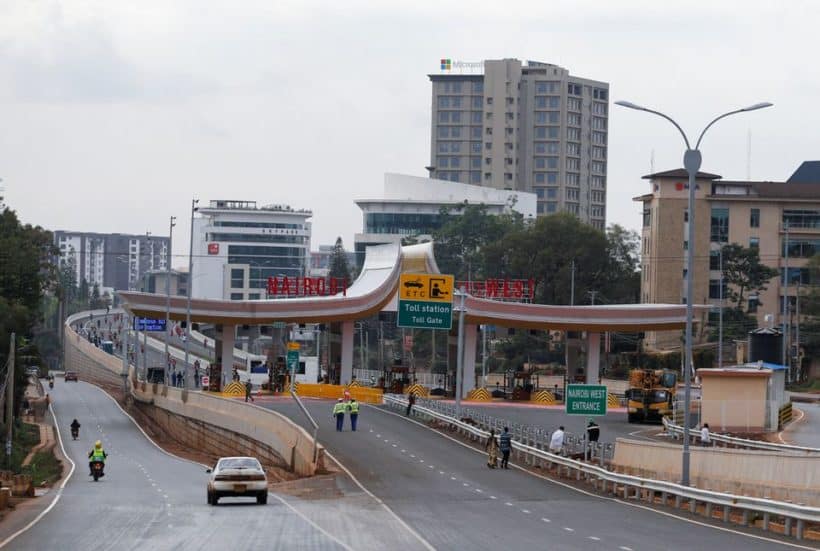
NAIROBI, July 28 (Reuters) – Kenya’s economic output has more than doubled during President Uhuru Kenyatta’s 10 years in office, but a debt binge that fuelled growth and investment could cramp his successor’s ability to tackle growing hunger and soaring prices.
Some 22 million voters will pick a new president, lawmakers and county officials on Aug. 9. The election is being overshadowed by a drought that has left 4 million people dependent on food aid while Russia’s invasion of Ukraine drives up global grain and fuel prices.
Kenya’s economy is now Africa’s sixth biggest, up from 13th when Kenyatta took power in April 2013. Annual growth averaging 3.8% over nine years has boosted gross domestic product to 11 trillion shillings ($92.75 billion) from under 5 trillion.
A close Western ally, East Africa’s most stable country also hosts the regional headquarters of international firms like Alphabet Inc GOOGL.O and Visa V.N.
Debt levels have surged, however, to 9 trillion shillings, or 67% of GDP, from just 2 trillion, or 40% of GDP, when Kenyatta was elected.
“The increase in debt has been alarmingly fast,” said Robert Shaw, an independent economic policy analyst based in Nairobi.
Kenyatta, who must stand down after serving two terms, says borrowing – including $8 billion from China – funded much-needed infrastructure and helped spur development.
His government has modernised Kenya’s crumbling, century-old railway network and built more kilometres of paved roads than the previous four administrations combined – over 10,000, Kenyatta told parliament in November.
He also said then that the number of households connected to the electricity grid had tripled to more than 8 million.
In 2018, the International Monetary Fund classified Kenya as at high risk of debt distress. That risk remains, the Fund’s Kenya head of mission Mary Goodman told journalists last week.
The yield on Kenya’s dollar Eurobond due 2024 XS1028952403=TE hit a record high of 22% on July 15, as rising U.S. interest rates and the Ukraine war make riskier assets less attractive to investors.
But Julius Muia, principal secretary in the ministry of finance, said debt is sustainable below 70% of GDP, adding: “The concern about debt is very misplaced.”
Tabitha Karanja, an opposition United Democratic Alliance candidate for the senate, said the government’s focus on infrastructure had left many vulnerable people behind.
“You can’t build roads for people who are hungry,” she said.
DEBT DILEMMA
Kenyatta’s preferred successor, veteran opposition leader Raila Odinga, has pledged to renegotiate terms for the debt to lengthen its maturity and free up cash to fund social interventions and development.
His main opponent, Kenyatta’s estranged deputy president William Ruto, says he would reduce borrowing and stimulate small enterprises to help drive growth and generate revenues.
But surging living costs, which many Kenyans blame on corruption, are uppermost in voters’ minds.
“Parents with children in school are suffering a lot. Food prices are also hurting them,” said Steve Otiende, a small shop owner in Nairobi.
The government has spent 12.6 billion shillings providing food for hunger-stricken communities, but says it needs more.
“The persistent drought has left us with a resource gap of more than 15 billion shillings required for interventions,” said Margaret Kobia, the minister in charge of special programmes.
ELEVATED YIELDS
Like other frontier economies, Kenya’s troubles have been compounded by stress in global markets, as major central banks start to reverse years of cheap money policies.
Kenya’s international bonds have lost 29% of their value this year, with only Ghana’s faring worse in Africa.
Market turmoil forced Kenya to abandon a $1 billion bond sale last month. The government is examining alternative financing and spending cuts, Muia at the finance ministry said.
But the risk premium over U.S. Treasuries paid by Kenya’s debt is now over the 1,000 basis points traditionally seen as a marker of distress.
Investor confidence could be shaken further by the election: two of the last three presidential polls were marred by violence, with 1,200 people killed in post-election clashes in 2007.
“It is very much unclear if the economy has the resilience to manage the coming quarters without crisis,” said Matthew Vogel, a London-based fund manager at FIM Partners, which specializes in frontier markets.
($1 = 118.6000 Kenyan shillings)
Kenya’s hard hit government bondshttps://tmsnrt.rs/3cG8mMj
Kenya’s stocks underperformhttps://tmsnrt.rs/3op0Vfb
The pain has spreadhttps://tmsnrt.rs/3cfEia9
Kenya’s bond worrieshttps://tmsnrt.rs/3or2fxR
(Reporting by Duncan Miriri; Additional reporting by Marc Jones in London; Editing by Katharine Houreld and Catherine Evans)

